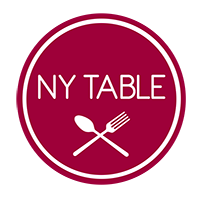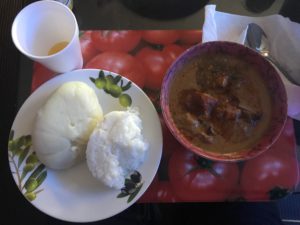In 1992, two siblings from West Africa opened a restaurant and named it Ebe Ye Yie. It means “everything will be all right” in Twi, a dialect of the West African Akan language. And though they contend with stagnant business, rising rent and an economic recovery they say never reached the Bronx, Fatima and Rauf Muhammed still have faith that everything will.
While Fatima, 57, is Ebe Ye Yie’s kitchen, Rauf, 67, takes care of the business end. It’s been slow for the past five years, Rauf says, and keeping the restaurant open looks increasing untenable. When they began in the early nineties the rent on their lease was $1,500, but it has since doubled, forcing the siblings to alternate between paying their utility bills and their vendors. Rauf wouldn’t say if he was holding out on paying anyone specific in a given week. “We’re doing our magic,” he said instead. “We’re going day by day.”
“Too much bill, too much problem,” Fatima complained, sitting at a table in the back of the house. “We have to rob Peter to pay Paul,” Rauf added. Lean and fit, Rauf still claims the energy of the young man who first came to the United States in 1972. He lived first in Yonkers, just north of the Bronx, while studying computer science at Westchester Community College, and drove a taxi at night to pay for essentials. He intended to work at IBM, but instead went into business for himself selling industrial sewing machines.
Fatima arrived 15 years after Rauf and relied on her brother to help find her work in kitchens as she assimilated. She met her husband and began her family. After a few years, Rauf had made enough money to get Fatima her own place, with the help of a generous neighbor.
But they never intended Ebe Ye Yie to be a family business. Fatima’s children, aged 17 and 25, still live at home and have no interest in running a restaurant. Rauf’s three children are all over 35, and have jobs in medicine and software and academia. Rauf doesn’t resent that his children found success in distinctly Western disciplines. “They have higher education,” Rauf explained. “I don’t feel bad at all, it was the right thing to do.”
The only things keeping the restaurant alive now are Fatima’s will to continue cooking and a stable of loyal regulars from the area. Ebe Ye Yie, on Jerome Avenue and 184th street, is right at home in the neighborhood of Little Accra, a West African enclave in the West Bronx. With a population of 20,000 Ghanaians, the Bronx houses the largest community of Rauf’s countrymen in the United States, with most of them living in Little Accra.
There’s no set menu; Fatima cooks what she has on hand or can get from the grocers at Hunts Point Market in the South Bronx. It’s the same way she cooks for herself and her family, and she treats patrons like honored guests in her home.
“In the restaurant, the food is better,” joked Ibrahim Muhammed, Fatima’s husband. A security guard in the Bronx and not a usual fixture at the restaurant, he was there to help Rauf mend a leak that forced Fatima to put out mats of grooved rubber in the dining room. “She spends so much time here,” he said. “She wants to do good for the customers.”
Fatima’s eyes are warm but tired, probably because her husband is right. West African lamb stew, her specialty, must begin early in the morning if Fatima wants the meat to reach the appropriate tenderness by the times the regulars arrive. “Ebe Ye Yie is a prayer,” she said. “Ebe Ye Yie like, everything you do, you hope, you want to be good.”
The cuisine is traditional West African fare, with peanut soup and stews of okra and goat and offal, but the centerpiece here is the fufu, yam and cassava mashed and pounded into a thick paste and employed as a combination of spoon and sponge to soak up stews.
“In New York, it’s the only place I come and feel at home,” said Mamadou Diallo, who moved to the Bronx from Guinea six years ago. Like other regulars, Diallo comes a few times a week to remind himself of the food of his homeland, which he said was good but could not articulate why, except to say, “it’s easy to digest.”
The dining room is dark even in the daytime, lit by waves made of blue neon tubing on the north and south walls; darker today because one set has burned out. Below the waves, rows of mirrors do what they can to create the illusion of a bigger room. A long, empty fish tank sits in the corner. On the walls, posters of Martin Luther King and Malcom X and Barack Obama coexist with framed Arabic calligraphy and an idolized, almost Rockwellian drawing of an African family, the man carrying the woman on his back, the woman with a child on hers, peering defiantly towards an uncertain future.
Now faced with the possibility of closing, Fatima and Rauf look to their own future. “I could close tomorrow if I want,” she said. “But this is America, and in America, you work.” Neither she nor Rauf were particularly daunted by the prospect of closing, but neither could say definitively what they’d do if that day came. Rauf said he would probably concentrate more on his own business, selling refurbished sewing machines to Africa and the Middle East. Fatima initially said she’d give up cooking, but proceeded to make exceptions for herself and her family and anyone else who comes to her house. She said she might try to find work as a nanny, but she wasn’t sure.
In the end, it seems their philosophy is the same as their restaurant: Ebe Ye Yie.


Your Comments